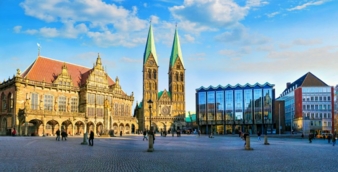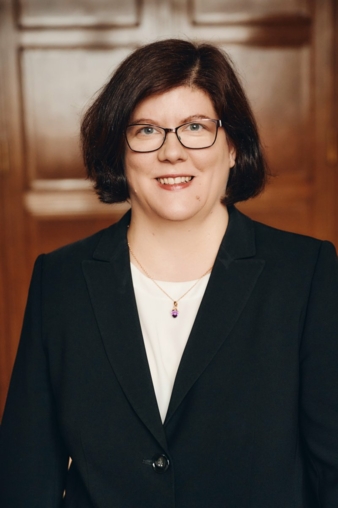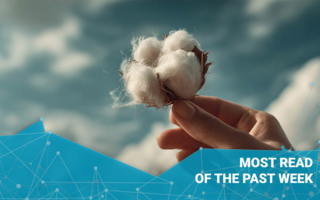23/03/2021 – 35th International Cotton Conference – The Hybrid Edition — auf Deutsch lesen
Cotton and Bremen are one
Bremen is a synonym for cotton, cotton research and cotton quality. More than 450 participants from 32 countries attended the conference.

Once again, the International Cotton Conference confirmed how closely Bremen is interwoven with the raw material cotton and its internationally networked supply chain. Ultimately, the organisers of the prestigious conference, the Bremen Cotton Exchange and the Fibre Institute Bremen, were able to bring the cotton world together in Bremen for the 35th time. A meeting of the cotton community on the world wide web. © EKH-Pictures/stock.adobe.com

Stephanie Silber, President of the Bremen Cotton Exchange and Managing Director of the traditional cotton trading company Otto Stadtlander GmbH: “We are very proud that the premiere of the hybrid version of the International Cotton Conference Bremen has ended successfully. I am therefore very grateful to everyone who made this possible.” © Bremer Baumwollbörse
The conference, which was originally planned for 2020, had to be postponed for a year for well-known reasons. However, since it is still not possible to hold a face-to-face event at the moment, the cotton community met for the first time in the almost 150-year history of the Bremen Cotton Exchange in virtual conference rooms on the Internet.
Almost 90 Speakers in 14 Sessions
On 17 and 18 March, around 90 speakers and panellists contributed to the success of the conference with highly topical presentations, or by taking part in discussions and keynotes. Before this, the conference opened with speeches by Bremen’s Mayor Dr Andreas Bovenschulte, Stephanie Silber, President of the Bremen Cotton Exchange, and Prof. Axel Herrmann, Director of the Fibre Institute Bremen. The subsequent programme, with its 14 sessions, was convincing in its diversity and extensive range of information.
The conference sessions were divided into two parallel lecture strands, intended for visitors with different information interests:
In the ‘Conceptual Track’, it was all about conveying information on a more political, strategic range of topics. These were, for example, sustainable cotton cultivation, transparency in the supply chain and corporate responsibility.
In the more subject-specific ‘Technical Track’, the leading role was given to technological advances in cotton cultivation through digitalisation, increasing yields, improving fibre quality, quality testing and standardisation.
Alongside the sessions, there were poster presentations or poster talks and exchange discussions with experts. These partly followed on from the content of the lectures or extended the range of experience with informative impulses on other subjects. To achieve this, special virtual rooms were set up on the conference platform, which were open to participants during the conference for communication purposes of all kinds.
State of the art expert knowledge
Each day of the conference began with two impressive keynotes from business or business associations, who approached the challenges of the cotton industry from different perspectives. They included Nanda Bergstein, Tchibo, Kai Hughes, ICAC, Heinz Zeller, Hugo Boss AG, and Michael Alt and Eugen Weinberg, Commerzbank AG.
Panel discussions on subjects such as responsible raw material production, supply chain transparency and circular economy set clear accents. As did lectures on advances in cotton seed breeding and production, digitalisation in agriculture, cotton processing, cotton quality and testing, and the presentation of innovative textile products made from cotton.
There was also a convincing presentation by the Fibre Institute Bremen on the results of a survey of spinning mills carried out worldwide in cooperation with the Bremen Cotton Exchange. The survey dealt with disruptive quality defects in supplied cotton, the use of fibre blends and the use of cotton from alternative production methods.
The results of a further survey conducted by the Bremen Cotton Exchange among clothing manufacturers and retailers also attracted a great deal of attention. It provided information on the evaluation of cotton quality and other cotton properties, the use of textiles made from other natural, mixed and/or man-made fibres, the importance of sustainability at retail level, and the willingness to make procurement processes transparent.
Two days before the start of the conference, international network meetings were held by both the Steering Committee of the Discover Natural Fibres Initiative (DNFI) and the International Committee on Cotton Testing Methods (ICCTM) of the International Textile Manufacturers Federation (ITMF).
Stephanie Silber, President of the Bremen Cotton Exchange and Managing Director of the traditional cotton trading company Otto Stadtlander GmbH:
“We are very proud that the premiere of the hybrid version of the International Cotton Conference Bremen has ended successfully. I am therefore very grateful to everyone who made this possible.”
Prof. Axel Herrmann for the Fibre Institute Bremen (FIBRE):
“The attractive composition of the conference programme once again shows how valuable the intensive cooperation between the Fibre Institute Bremen and the Bremen Cotton Exchange is, in which science and practice complement each other perfectly.”
Mark Messura, Senior Vice President, Global Supply Chain Marketing for Cotton Incorporated:
“Again, the Bremen Conference has brought together leaders from around the world to address the critical ideas and challenges facing our industry. This conference continued to advance the sustainability efforts that are so important to all of us as we pursue the technical and market opportunities for cotton.”
Prof. Thomas Schneider, University of Applied Sciences for Technology and Economics (HTW), Berlin:
“We have seen that cotton is indispensable for the future because of its properties as a natural, innovative, renewable, biodegradable, and recyclable raw material. The possibilities of its use go far beyond processing into clothing and are far from exhausted from the point of view of research.”
The next International Cotton Conference will be held on March 30–31, 2022, the year of the 150th anniversary of the Bremen Cotton Exchange.



